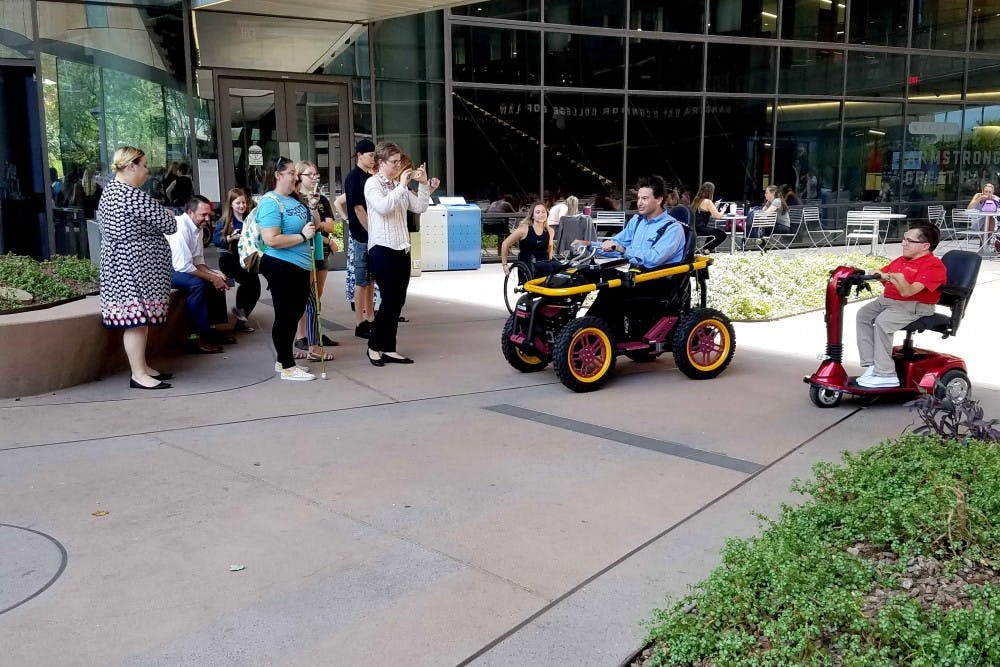ASU is the first university in the nation to utilize a new all-terrain vehicle that allows people who are mobility challenged to participate in outdoor activities.
"The TerrainHopper is designed for people who are mobility challenged to get out in the outdoor environment to do things that they couldn’t normally do with their existing wheelchair,” said Todd Lemay, owner of TerrainHopper USA.
While the TerrainHopper is designed for people who use wheelchairs, it is not a wheelchair, Lemay said, but an alternative to a wheelchair that allows people to do things like hike mountains.
Lemay, an ASU alumnus, has relied on wheelchairs his whole life. His intern, Christina Chambers, an ASU parks and recreation senior who uses a wheelchair, convinced Lemay to donate one of his $18,000 TerrainHopper's to the school.
A big part of Lemay's decision to donate the TerrainHopper was to make students like Chambers feel like they can take part in the same activities everyone else does. The TerrainHopper can be customized with a variety of features to accommodate almost every physical disability.
“I think technology like the TerrainHopper allows people to participate," Lemay said. "They feel a sense of belonging, a sense of community if they’re allowed participate with their friends and families in as many activities as possible.”
Jonathan Koppell, dean of the Watts College of Public Service and Community Solutions, was thrilled to integrate the TerrainHopper into the Parks and Rec and Recreational Therapy programs at the college.
Available to any mobility challenged student on campus, Koppell plans for the technology to empower people within the recreational therapy program to achieve their full potential within the program, mobility disabled or not.
The TerrainHopper can be requested by students to use at specific times, like a class field trip, for example.
Even further, Koppell aims to conduct research to document the "interesting things" the TerrainHopper is capable of and the overall benefits of the vehicle in order to get other universities to follow suit in using the technology.
“Our college is dedicated to advancing a vision of a more inclusive, more dynamic and more equitable society," Koppell said. “The use of this technology and making the TerrainHopper available to our students is really an extension of the ASU philosophy of inclusiveness.”
Even further, Koppell appreciated the TerrainHopper's influence on not just school, but in everyday life as well.
"The contribution here will be not just about using the TerrainHopper but better understanding how society is better when you make technologies like this available to more people,” Koppell said.
Kelly Ramella, therapeutic recreation program coordinator at Watts, echoed Koppell.
“One of the most important things is how we can stimulate and how we can learn from the TerrainHopper and maybe take it on to some new level," Ramella said.
A teacher of therapeutic recreation, Ramella values how the TerrainHopper impacts her work and strives to have student research conducted to better understand the technology.
“It’s fascinating how it's engineered and how we can improve it and use it in different ways," Ramella said. “Its empowering the individual with the disability to be as independent as possible.”
Koppell said that he is really excited about what the TerrainHopper represents, and he hopes other entrepreneurs can use it as an inspiration.
“It really is a terrific example of what’s possible when you’re creative about solving challenges,” Koppell said.
Reach the reporter at mallench@asu.edu and @mallencharmley on Twitter.
Like The State Press on Facebook and follow @statepress on Twitter.




